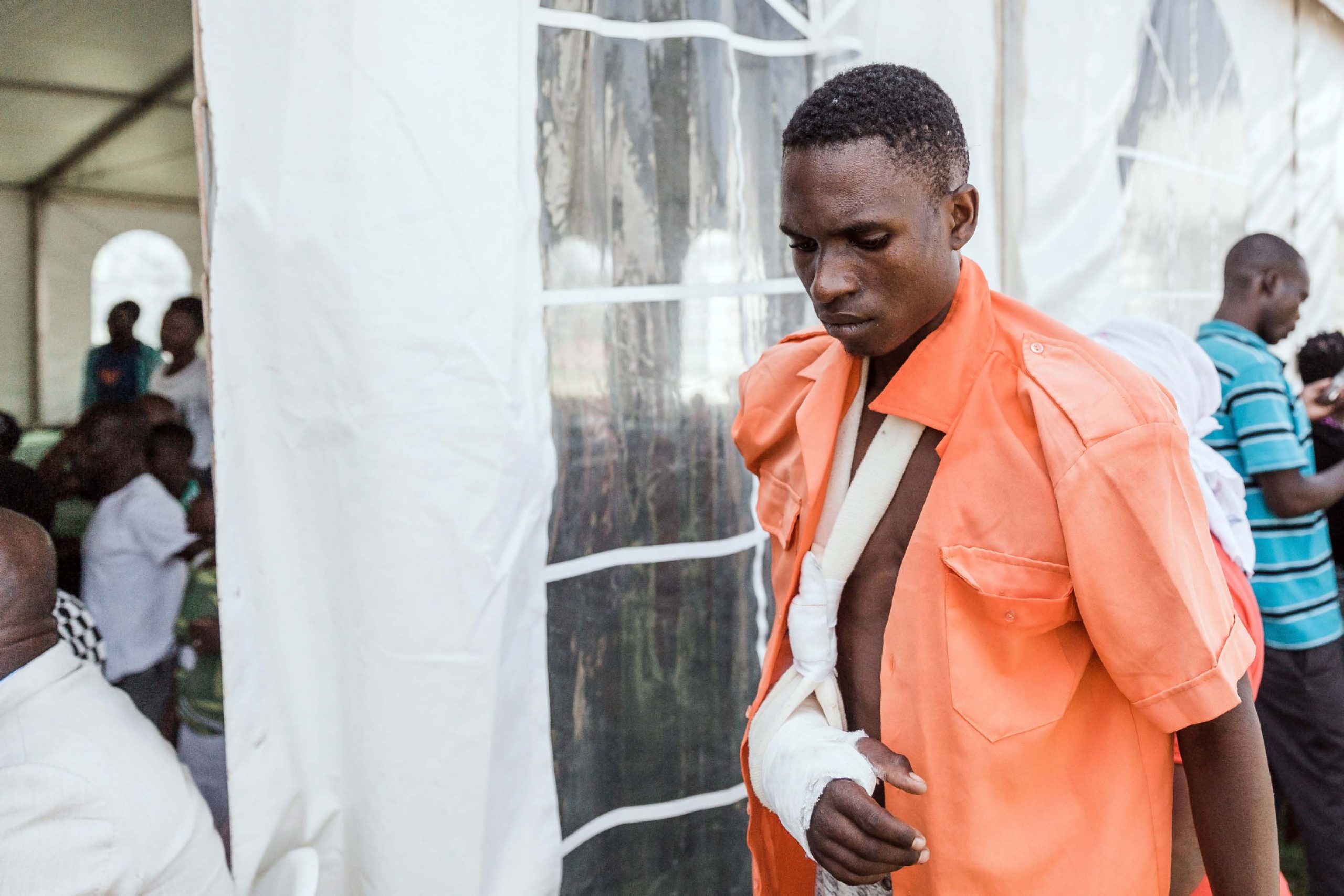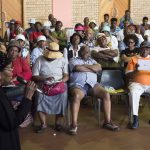Politicians’ denial of xenophobia
South African politicians are simultaneously encouraging and legitimating xenophobia, and denying that attacks on migrants are xenophobic.
Author:
25 April 2019

“Both the municipality and the Malawian High Commission are in agreement that the incidents that led to Malawian nationals being chased out of their homes are not xenophobia but were criminally motivated, as their belongings were stolen by the angry mob.”
This was the response from Durban’s eThekwini Municipality following attacks against Malawians in April that displaced about 100 migrants.
This denialism is not a new phenomenon. In 2006 Michael Neocosmos noted the pervasive denialism around xenophobia by the political class in his seminal book, From ‘Foreign Natives’ to ‘Native Foreigners.
Related article:
Following xenophobic attacks in May 2008, the Mail & Guardian quoted Thabo Mbeki, whose history of denialism in other contexts is notorious, as saying: “What happened during those days was not inspired by possessed nationalism, or extreme chauvinism, resulting in our communities violently expressing the hitherto unknown sentiments of mass and mindless hatred of foreigners – xenophobia.”
In 2015, following the murder of Mozambique national Emmanuel Sitole, whose picture was published on the front page of the Sunday Times newspaper, then president Jacob Zuma lamented: “What are we telling the world about ourselves?”
Following the attacks, the government set up an ad hoc committee, whose members included politicians Ruth Bhengu and Tekoetsile Motleshuping, to investigate violence against migrants. During community engagements at the Jeppe and Alexandra police stations, the committee emphasised that the attacks they were investigating were “criminality” and not xenophobia.
“We must move away from this xenophobic word, because it brings us to the wars and makes it seem like South Africans hate foreigners, when we have lived with whites and Indians who we don’t know where they come from. We are proudly South African,” Bhengu said at the Jeppe police station in July 2015.
In 2017 Mbeki told the fourth African Peer Review Mechanism conference in 2017 that: “There isn’t a population of South Africans who attack other Africans simply because of their nationality.”
Pervasive denialism
Government’s systematic denial of the existence and extent of xenophobia has created an environment in which politicians and parties have been allowed to campaign on grossly xenophobic platforms ahead of the coming election. Beyond the creation of this dangerous form of politics, we have seen the normalisation of a narrative in which politicians vilify African and Asian migrants living or working in working-class and impoverished areas instead of taking accountability for their parties’ inadequacies and failures.
It is not only the DA and the ANC that are campaigning on openly xenophobic platforms. Small parties such as the People’s Revolutionary Movement, the Forum 4 Service Delivery and the African Basic Movement all espouse outright xenophobic sentiments.
Related article:
The African Basic Movement was not allowed to register for the 8 May election and is now supporting the Forum 4 Service Delivery, whose first “demand” is for “all foreign nationals to leave the country immediately”.
The People’s Revolutionary Movement recently protested outside the Diakonia Centre in Durban, which houses organisations that in work in solidarity with refugees and migrants. The party’s demands included a call for all migrants to leave the country.
The influence of politicians
Even with the crude xenophobia at the centre of the new forms of right-wing populism festering across the planet, these demands are extreme. But their logic, perverse as it is, follows that of a number of government officials. Minister of Health Aaron Motsoaledi has blamed overcrowding in hospitals on migrants and Johannesburg Mayor Herman Mashaba has repeatedly blamed crime in the city on migrants.
Words have material consequences. Last month, nearly 100 Malawian migrants were sleeping out in the open, displaced by a xenophobic attack. Some of their attackers explicitly linked their actions to comments made by politicians.
Related article:
Following these attacks, Minister of International Relations and Cooperation Lindiwe Sisulu said at a memorial for anti-apartheid stalwart Phyllis Naidoo that the government had roped in non-governmental organisations (NGOs) to help them. “Since 2008, we have not been able to get to the bottom of what is happening in South Africa and to stop this. We have had engagements with a wide range of NGOs at presidential level trying to see how we can get out of this.”
Following the standard script used by politicians, she insisted that the attacks against Malawians were criminal and not xenophobic.
‘Right-wing shift’
Africa Solidarity Network secretary general Daniel Dunia has called on government to acknowledge xenophobia for what it is.
“Xenophobia is increasing because there is no mechanism of mitigating it. The government is not able to deal with it because … they don’t agree that there is a problem, so you will never get a solution … They are calling it criminality, they are trying to avoid calling it xenophobia, and this makes it worse and worse and worse. The government denial is increasing xenophobia in this country,” Dunia said.
Related article:
Loren B Landau at the African Centre for Migration and Society at Wits University told New Frame there has hardly been any action domestically to address the root causes or triggers of xenophobic violence. Government has introduced numerous initiatives to address xenophobia, but they appear to be largely oriented to protecting South Africa’s “international reputation and forestalling diplomatic backlash”, he said.
Sharon Ekambaram, the refugee and migrant rights programme manager at Lawyers for Human Rights, said South Africa was following a global shift to the right, with the ANC resorting to “populist rhetoric” to win votes by blaming migrants for a failed healthcare system and a failing education system. She added that the increased use of arrests and deportation as tools to manage migration in South Africa is in line with the “international right-wing shift against migrants”.
Fighting xenophobia
What’s often forgotten is that a number of large, membership-based organisations – including trade unions and shack dwellers’ movement Abahlali baseMjondolo – have taken consistent positions against xenophobia, and included migrants in their leadership structures.
The attacks against migrant traders in Makhanda (then Grahamstown) in 2015, which specifically targeted Muslims, were organised by local businessmen, many with links to local structures of the ruling party. It was a grassroots organisation, the Unemployed People’s Movement (UPM), that was at the forefront of opposing the attacks, and organising shelter and other aid for those who were displaced. UPM founder Ayanda Kota said he had not seen any “government programmes aimed at integration” since then.
“When xenophobia broke out in Makhanda, we were then able to do dialogues in different communities and we were able to do door-to-door visits,” he said. “It is not surprising that government is walking on eggshells on this matter. They understand this is a class matter. It is underpinned by poverty, it is underpinned by unemployment … This discontent and this anger is directed in the wrong direction and at their fellow people … We must take the bull by the horns,” Kota said.
But as long as politicians continue to refuse to “take the bull by the horns” and confront the reality of the situation, the elite – from ministers to local politicians and businesspeople – will continue to encourage xenophobia to try and turn impoverished people against their neighbours rather than the structures and forces that keep them oppressed.




